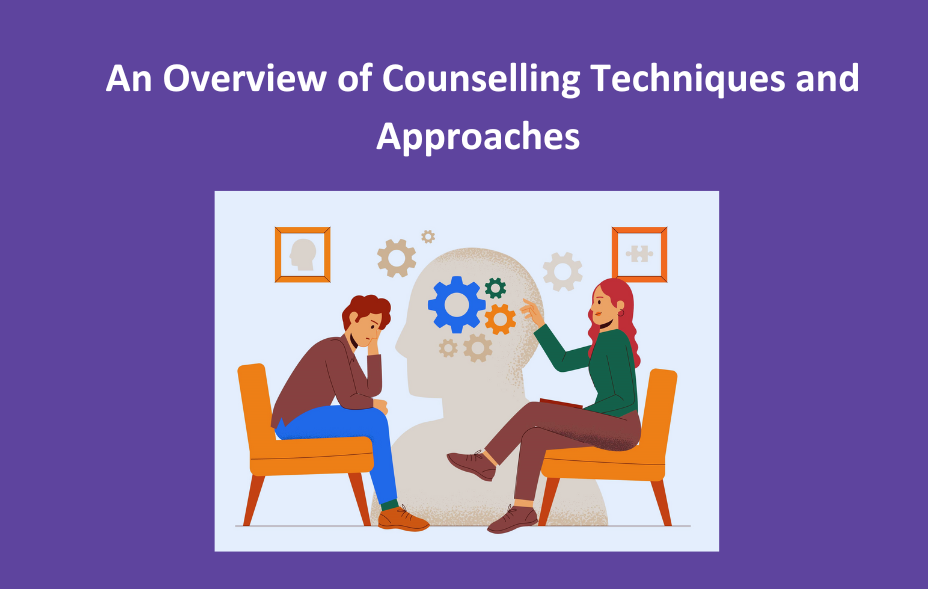In a world where the importance of mental health and well-being has gained significant recognition, the demand for qualified professionals with a Health and Safety Certification in counselling has never been higher. But What is Counselling, exactly? In this blog, we’ll delve into the world of counselling, exploring its various techniques and approaches developed to support individuals in their mental and emotional well-being journey.
Table of Contents
- What is Counselling?
- Counselling Techniques and Approaches
- Cognitive-Behavioral Therapy (CBT)
- Person-Centred Therapy
- Psychodynamic Therapy
- Gestalt Therapy
- Solution-Focused Brief Therapy (SFBT)
- Art Therapy
- Narrative Therapy
- Mindfulness-Based Therapy
- Family Systems Therapy
- Holistic Counselling
- Conclusion
What is Counselling?
Before we explore the various counselling techniques and approaches, it’s crucial to grasp the core concept of counselling. In simple terms, counselling is a therapeutic journey to assist individuals in facing life’s difficulties, examining their thoughts and emotions, and cultivating coping methods to enhance their overall mental and emotional well-being.
Counsellors are trained professionals who offer support, guidance, and a safe space for individuals to discuss their concerns, fears, and aspirations. They help clients gain insight into their feelings and behaviours, empowering them to make positive life changes. To become a counsellor, one often pursues a Health and Safety Certification, which equips them with the necessary knowledge and skills to assist others in achieving emotional and mental well-being.
Counselling Techniques and Approaches
Counselling is a multifaceted field, and there is no one-size-fits-all approach. Different techniques and approaches are employed based on the client’s unique needs and the counsellor’s expertise. Let’s explore some of the most prominent counselling techniques and approaches:
Cognitive-Behavioral Therapy (CBT)
CBT, or Cognitive Behavioral Therapy, stands out as one of the most commonly employed counselling methodologies. Its primary emphasis lies in identifying and altering detrimental thought patterns and behaviours. In CBT, clients collaborate with their counsellors to pinpoint irrational beliefs and substitute them with more positive and constructive alternatives. CBT has proven to be exceptionally successful in addressing a wide spectrum of concerns, ranging from anxiety and depression to substance abuse.
Person-Centred Therapy
Developed by Carl Rogers, this approach emphasises the importance of the therapeutic relationship. Person-centred therapy creates a non-judgmental, empathetic environment where clients can explore their feelings and experiences. The counsellor’s role is to provide unconditional positive regard and active listening, facilitating the client’s self-discovery and personal growth.
Psychodynamic Therapy
This approach delves into the unconscious mind, drawing from Freudian theories. Psychodynamic therapy explores how early life experiences and unconscious conflicts influence present behaviour and emotions. Through self-reflection and interpretation, clients gain insights into their subconscious and work towards resolution.
Gestalt Therapy
Gestalt therapy places its emphasis on the present moment, urging clients to cultivate awareness of their current thoughts, emotions, and physical sensations. It motivates clients to assume accountability for their behaviours and delve into unresolved matters. This approach frequently incorporates activities like role-playing and creative methods to amplify self-awareness.
Solution-Focused Brief Therapy (SFBT)
SFBT, or Solution-Focused Brief Therapy, is a goal-driven method focusing on discovering solutions rather than fixating on problems. Clients are motivated to envision a future where their challenges are resolved and collaborate closely with their counselor to pinpoint practical steps for reaching their objectives. This approach is particularly efficient for clients in search of brief and goal-oriented counselling.
Art Therapy
Art therapy can be a powerful tool for clients who struggle to express themselves verbally. This approach involves the use of art materials to facilitate self-expression and exploration of emotions. Art therapists interpret clients’ creations and help them understand their feelings and experiences.
Narrative Therapy
Narrative therapy views individuals as the authors of their own stories. Clients and counsellors work together to deconstruct unhelpful narratives and reframe them in a more empowering light. This approach helps clients recognise their strengths and resilience.
Mindfulness-Based Therapy
Mindfulness techniques are integrated into counselling to help clients become more present and aware. Mindfulness practices like meditation and deep breathing can reduce stress and anxiety, enhance self-awareness, and improve overall well-being.
Family Systems Therapy
This approach focuses on understanding family dynamics and how they impact individual members. Family systems therapy aims to identify and address dysfunctional communication and behaviour patterns within the family unit.
Holistic Counselling
Holistic counselling takes a comprehensive approach, considering an individual’s life’s physical, emotional, social, and spiritual aspects. It promotes balance and well-being by addressing all these facets.
Counselling is a field with a diverse range of techniques and approaches aimed at helping individuals achieve better mental and emotional health. Whether seeking help for personal growth or facing specific challenges, a certified counsellor can provide the guidance and support you need.
The journey to mental and emotional well-being may involve various counselling techniques, so finding the approach that resonates with you and your unique needs is essential. Remember, a Health and Safety Certification is just the beginning of a counsellor’s journey to becoming a compassionate and effective professional who can make a positive impact on the lives of others.
Conclusion
There are a wide array of techniques and approaches to address diverse mental health challenges. From the client-centered approach that emphasizes empathy and active listening to the cognitive-behavioral approach’s focus on changing thought patterns, and the holistic approach that considers mind, body, and spirit – there is no one-size-fits-all solution in Counselling. The key to effective Counselling lies in tailoring these techniques to individual needs and circumstances. Additionally, ongoing research and innovation, along with access to Health & Safety Courses, continue to shape the field, ensuring that counselors have a rich toolkit to assist clients in their journeys toward improved mental well-being.

